MS Cunard Adventurer & Ambassador and their
later versions
Note: iPhones, iPads, Firefox & some other Search Engines may not be suitable
Use Google Chrome for this Web Page to load perfectly!

Click
the logo above to reach the ssMaritime FrontPage for News Updates &
“Ship of the Month”
With Reuben
Goossens
Maritime
Historian, Author, Lecturer & Cruise‘n’Ship Reviewer
Please Note:
All ssmaritime as well as my other related maritime & cruise sites are 100%
non-commercial and privately owned sites. Be assured that I am NOT associated
with any shipping or cruise companies or agencies or any other organisations!
The author has been in the passenger shipping industry since May 1960, but
although retired and unwell, I occasionally attempt to write an article now and
then, in order to bring enjoyment and pleasure to ship enthusiasts past
passengers and crew.
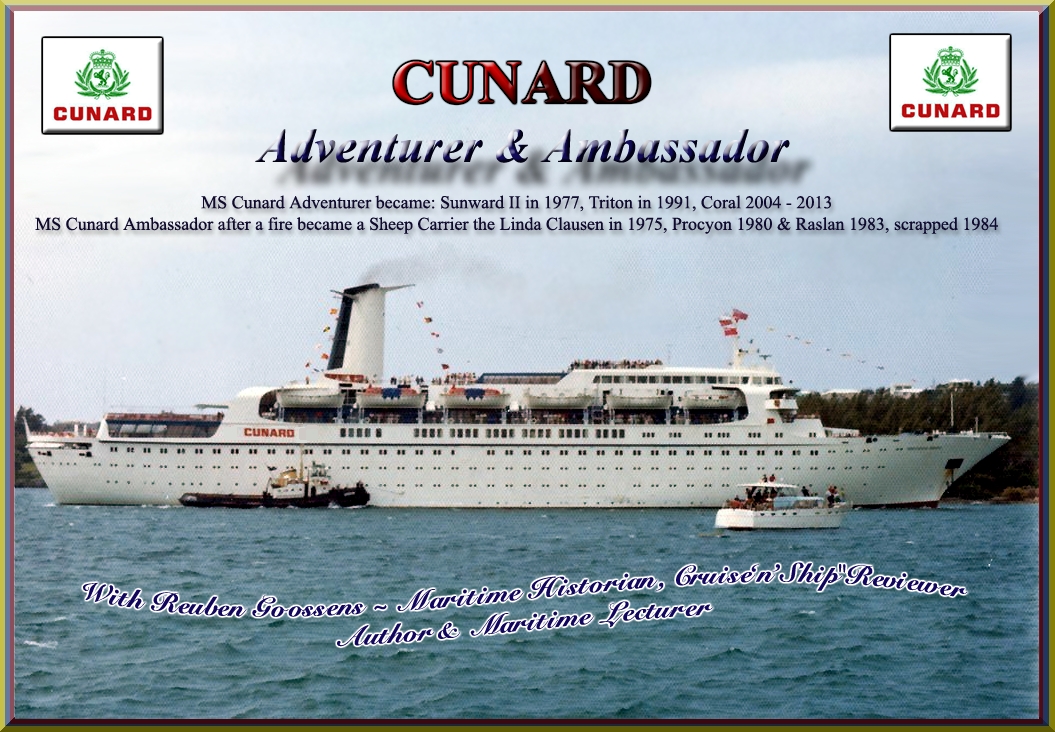
Page
Two
Covering the MS Cunard Adventurer - Also the ship as the MS Sunward II
Please
Note: Photographs and other images on this feature
are from the author’s private collection unless stated otherwise
The
Introduction part of this page below is very much the same as on Page One, which
mostly covers the Cunard Adventurer, but I have included it here for those who
may have arrived on this page via a search engine. You can go and read Page One first, or do
so after reading this page as there is a full index to this seven page feature
at the bottom of this page.
Introduction:
A
series of eight identical ships were especially designed for the
“Overseas National Airways” (ONA) in the mid-sixties to be built in
the early seventies. Two ships were ordered to be built; the first to be
commenced was by the “Rotterdamsche Droogdok Maatschappij
N.V.”, of Rotterdam,
the Netherlands
and the second a year later by “P. Smit Jr Shipbuilders,” also in Rotterdam.
But OAM soon enough realised that due to the
huge amounts of money that was being placed into the project with the first two
ships, ONA found that in 1971 they were running into financial difficulties and
they had to abort their project, even though the ships were already partially
built! However, considering that Cunard Line had a 50% share in ONA, they
decided to take the opportunity to take over ONA as well as these two ships and
enter them into a new Cunard fly/cruise market in the America’s, and thus
they commenced in a new market! In the meantime the other six
ships were cancelled and Cunard ensured that the two ships in building would be
completed as soon as possible.
Cunard’s new cruise ships when launched
were named the Cunard Adventurer of 1971 and Cunard Ambassador of 1972.
Cunard knew that once completed that both the
Adventurer as well as her identical sister the Ambassador would essentially
operate seven-day cruises for which the were especially designed! Some of the
cruises planned were; San
Juan to Caribbean and
South American ports, as well as New
York to Bermuda, as
well the ever-popular Alaska
cruises out of Vancouver
and Trans-Panama canal voyages during the summer months.
Although these ships officially became Cunard
cruise ships, but as the Adventurer was the first of the pair to be launched
and named, she became the very first Cunard ship in the 20th.century to be given a name that did not end
in “ia” or begin with “Queen,”
therefore she and her sister commenced a whole new trend!
But the simple truth was and this was obvious
right from the beginning was that both ships were not really suitable to be
true Cunard ships, for they did not meet the stringent Cunard requirements.
Therefore both their lives with the company would sadly be rather short lived.
Ships exterior appearance:
Upon
first sighting the new ships they certainly stood out from any other ship in
the world, for their overall design was so advanced and certainly unusual! The
hull with four decks was somewhat bulky looking, although in reality it was
really beautifully long and sleek with a nicely shaped curved bow with a long
protruding bulbous bow and a nicely rounded traditional style stern. However,
due to her high sides it had a slab like appearance and was also due to the
somewhat low slung, yet ultra modern low superstructure of just four decks.
However, the lowest deck of her superstructure was almost fully enclosed, thus
giving her hull that additional high appearance! Above this was her Boat
(Promenade) deck with Lifeboats directly above on Bridge deck, and top side on
Sun deck forward there was the spacious “Sky Room” that that had
window facing forward and on both sides of the ship with doors aft out to the
spacious Sun Deck.

A
good look at the side on design in this image reveals her rather unusual design
for the very early 1970’s
However
these ships had three very unusual features, which made them stand out from all
other ships. Both forward and aft there were two of these features and they
were located alongside of the superstructure and they where shapely slab like
panels placed on the exterior side of the ship that looked like they were part
of the hull and it reached up to around deck level of Sun Deck. The top of each
panel was curved inward and shaped to fit in with the ship. The forward one
became the roofline of the Bridge and reached around to meet the one on the
other side and it also reached a little aft. The aft panel was more curved from
aft to forward and when it reached the top it became part of the funnel
housing. The third feature was not as attractive as the first two, for they
looked very good! But the funnel was without a doubt the most prominent feature
of these ships, for you just could not miss it, even if you tried! And let me
say this, it was without a doubt a funnel once you had seen it, you would
always know what ship it was, even from a distance at sea! It was rather
slender sided and very tall and strangely enough although the front although it
being almost vertical, the funnel always seemed to appear as it leaned slightly
forward. This was mostly due to the forward section having a white wrap around
section, whilst the aft section of the funnel was shaped and slanted backward,
thus giving the appearance of it leaning forward. The back of the funnel from
top to the bottom was dark blue in colour.
You will note:
that this page does not feature many of the ships interiors, the reason for
this is that these will be covered on a very special photo page, being Page
Three!
Sadly and this became rapidly obvious very
early that both these ships were not really suitable to be genuine Cunard ships,
for they did not meet the stringent Cunard requirements. Therefore their lives
with the company would be rather short lived.
Although the Cunard Adventurer was
indeed the first of the pair to be built, but I have decided to cover her on
Page Two, whist I dedicated Page One to the more tragic Cunard Ambassador which
had a rather sad, varied and also a very short life as 1. A
cruise ship. 2. And a livestock/sheep transport ship for a number of
owners!
PLEASE NOTE: Recently I have obtained a supreme bundle of photographs which
were taken by the ships respective builders, there images and photographs
include artist drawings of the proposed interiors, there are models of the
future ships as well as the finest interiors, photographs of the
launching’s, etc as well as their sea trails and many other photographs!
All these photographs are all exclusive to ssMaritime. However, I wish to
personally thank Mr.
Don Leavitt
of www.nautiques.net who has located all these amazing
items for me and thus he deserves credit! For those who are looking for
maritime memorabilia, Nautiques.net is one of the very best placed to go and
best yet, the prices are simply excellent! You can email Don
at: dml@nautiques.net. All items
marked *Photograph part of the Author’s private collection were
obtained from Don!
******************************
MS
Cunard Adventurer
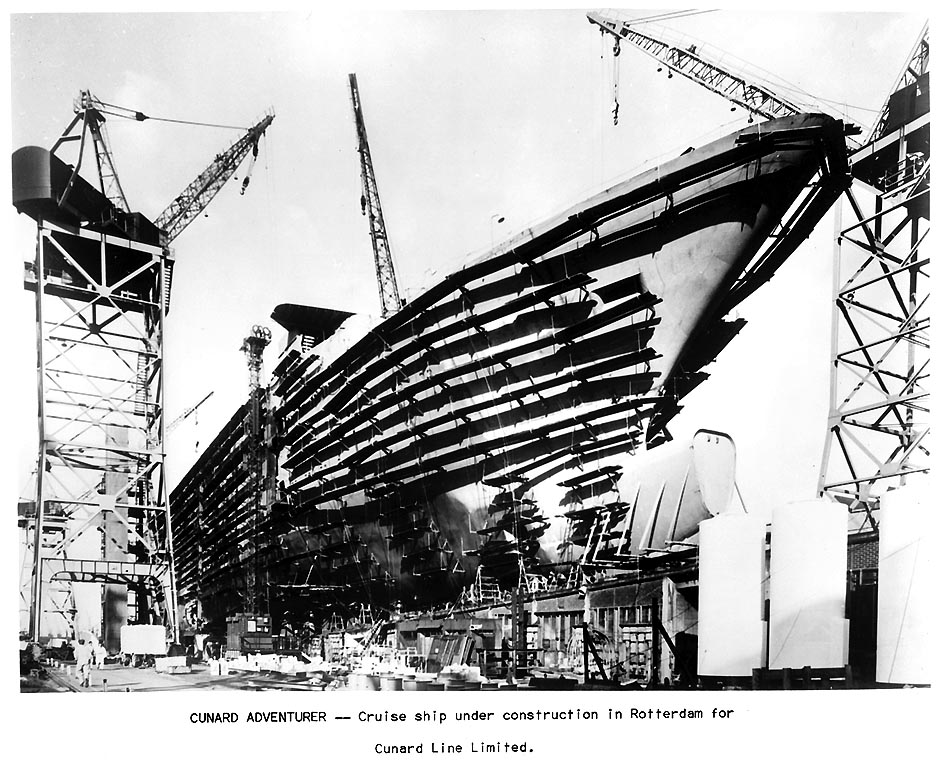
MS Cunard Adventurer
Introduction:
This
ship was the first of the pair built and she was built by the famous
“Rotterdamsche Droogdok Maatschappij N.V.,” in the Netherlands
and she was launched on February 2, 1971.
When her fitting out had been completed, she
undertook her North Sea deep-sea trails on August 28, and she reached a
respectable top speed of 24 knots, whilst the ship was found to be without any
shudders whatsoever, which was a great plus for her designers!
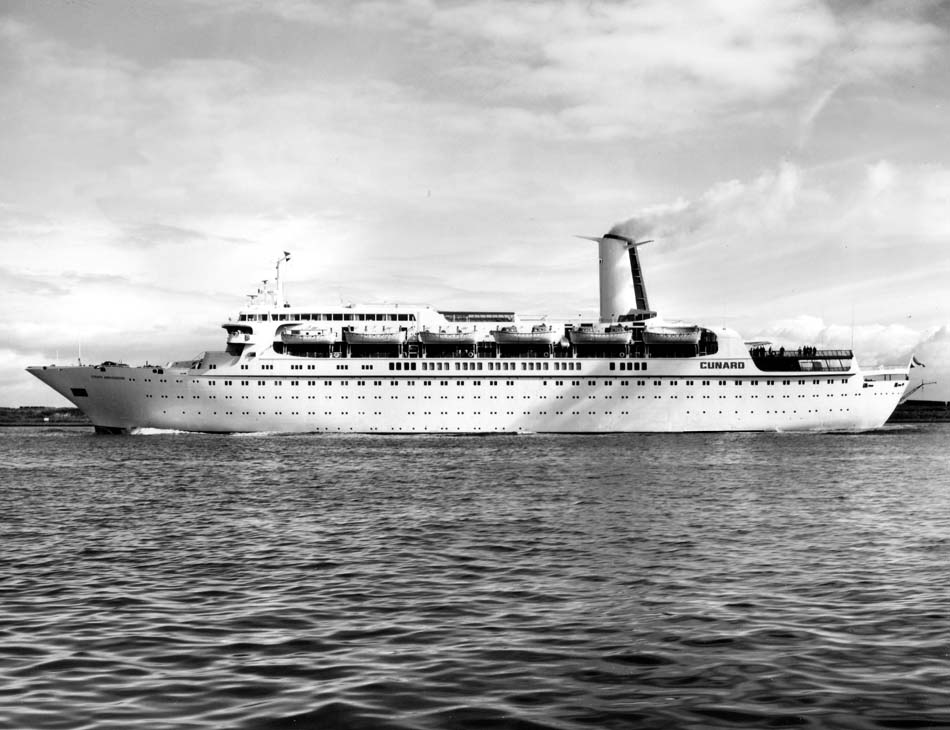
A photograph taken by the builders as the
Adventurer was heading off on her sea-trails, note the Dutch flag at her stern!
When she was ready the MS Cunard Adventurer
was delivered to her owners in Southampton to a great welcome on October 19,
1971 she would be in Southampton for a whole month, being made ready and crewed
for her maiden voyage to Puerto Rico. Therefore, during
this period considering she was a whole new style of ship for the company, she
was used for a good number of publicity opportunities, such as functions for
the travel industry and other guests, including prospective travellers, who
would be most likely in the future book a fly/cruise vacation on her or her
sister, as she would be ready just a year later.
At 14,151 GRT (Gross Registered Tons) she
accommodated 832 passengers in a One all First Class configuration with a crew
of 412 and she operated at a cruising speed of 22 knots.
Photo
Gallery
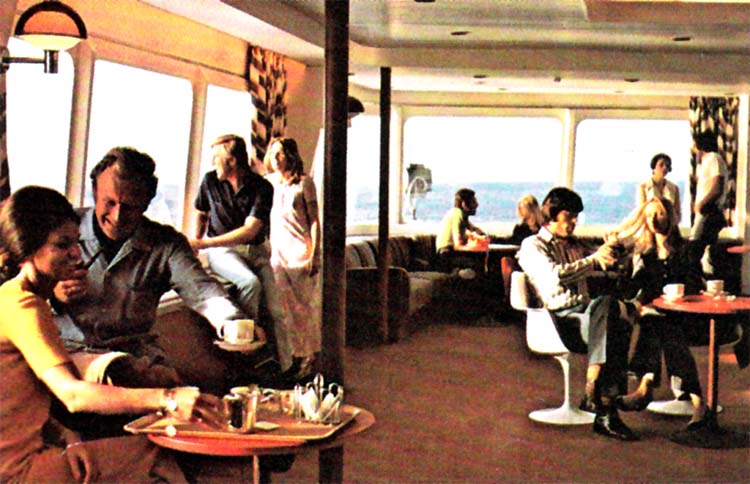
The Sky Room
located far forward atop of the ship – this was indeed a “Room with
a View”
These
five images were sourced out of one the brochures from my collection
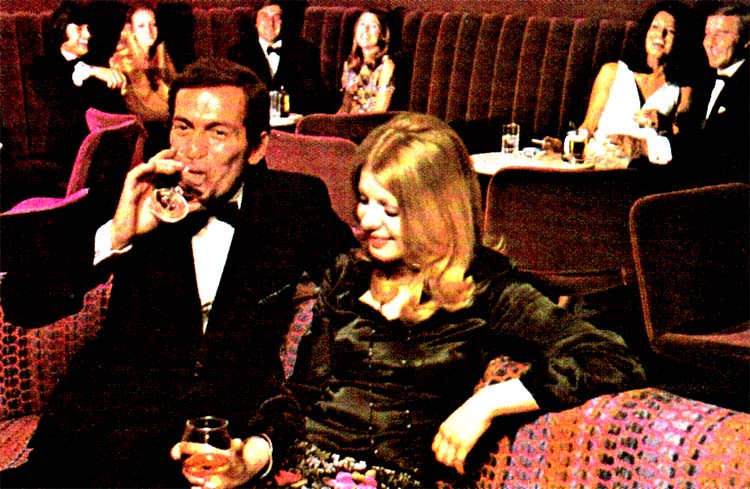
The Mayflower
Room was an elegant Lounge and Ballroom and entertainment venue
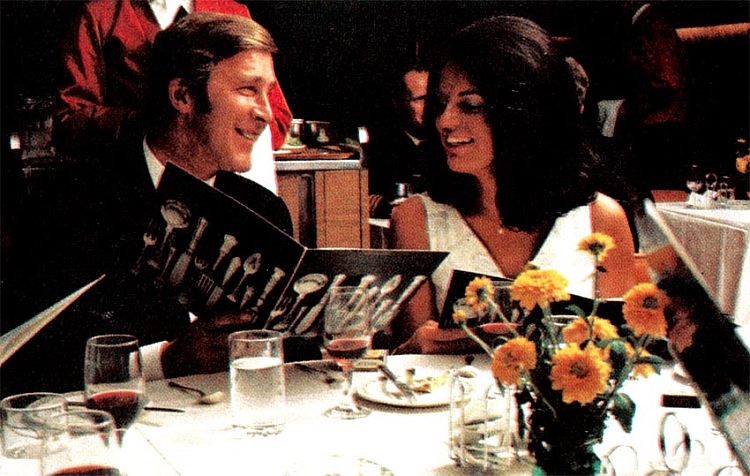
The Sir Walter
Raleigh Restaurant offers superb dinning with the best that Cunard can possibly
offer!
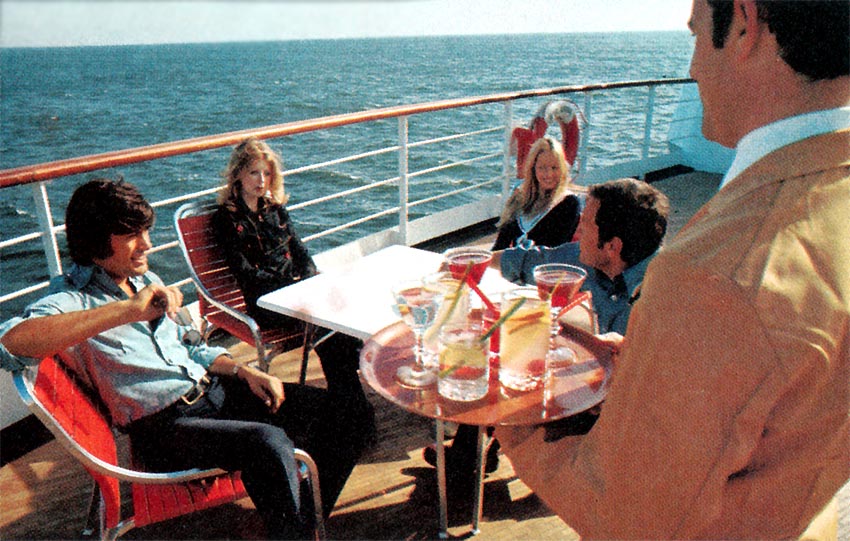
A relaxing time out on deck and always a
friendly steward at hand
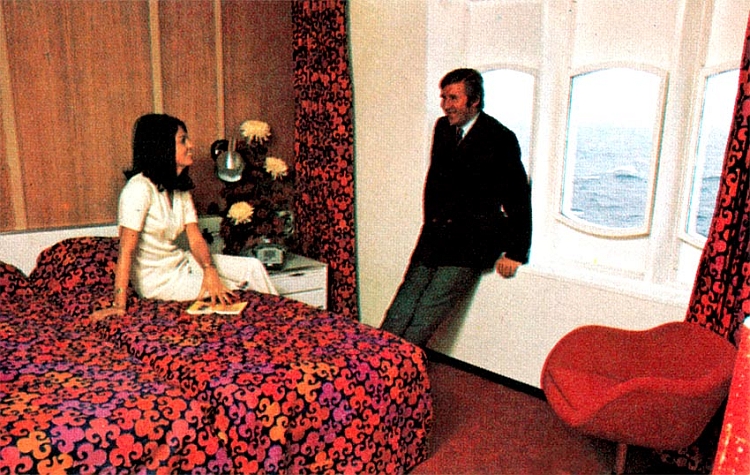
The ship offered
a fine range of excellent Staterooms
Then, on November 19, the delightful Cunard
Adventurer departed Southampton
for her maiden voyage fully booked and sailed across the Atlantic bound for San
Juan in Puerto Rico.
From here she commenced fly/cruises for American and British passengers to
visit South America and the wonderful Caribbean!
Later, she would sail around the Caribbean
from other destinations as well.
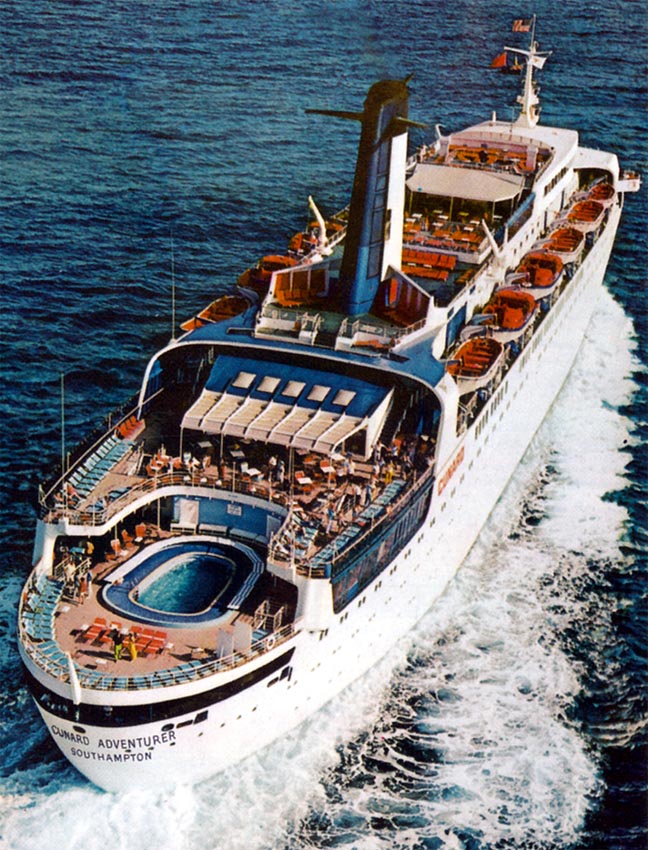
What
a wonderful view of the aft and amidships decks of the Cunard Adventurer
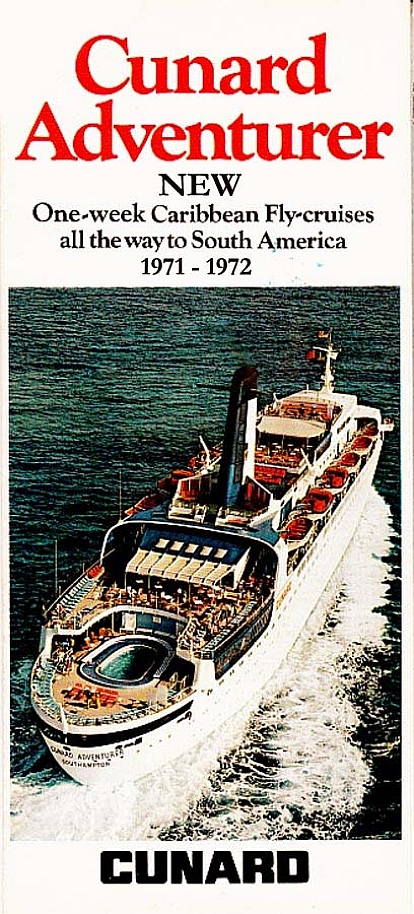
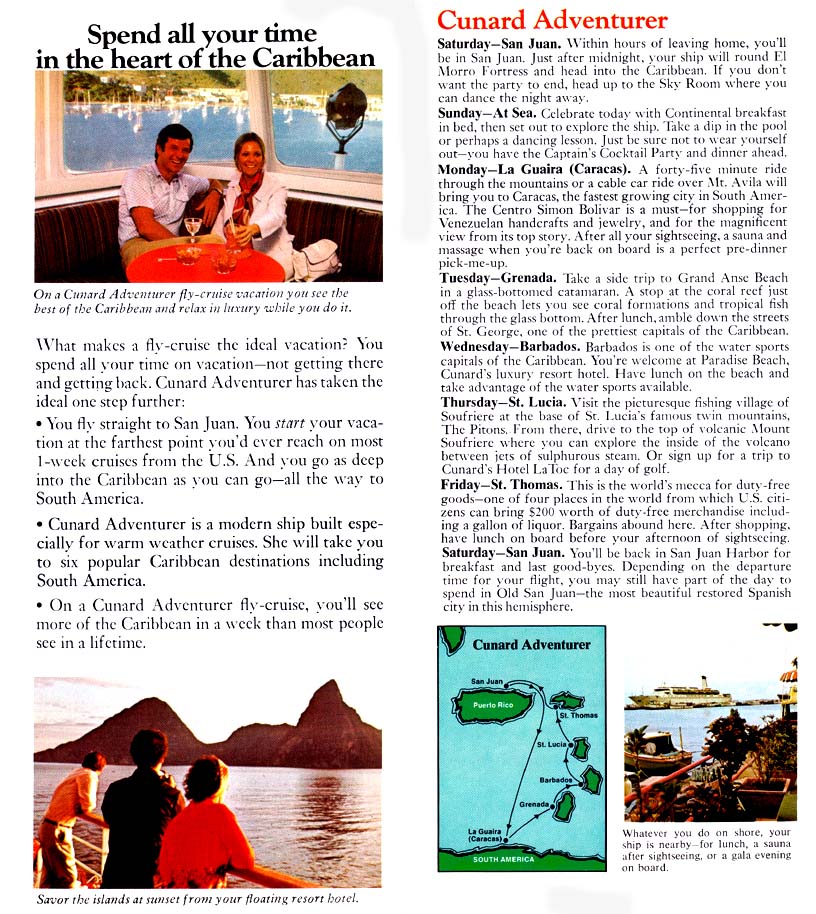
This
is the front cover (left) and the interior containing ships details and the
itinerary
Cunard Ambassador’s maiden
arrival in Hamilton Bermuda, a port where she would spend a great deal of time,
considering she would operate 7-night cruises departing Norfolk Virginia and
she would remain in Hamilton for four full days, this the voyage would offer
two full days and four nights at sea.
Her maiden arrival in Bermuda was on May 10,
1972 when Cunard Adventurer’s Master, Captain Peter Jackson invited
dignitaries and other leading local guests and agents, etc to join him and his
officers for a special reception to be held on board in the Mayflower Room.
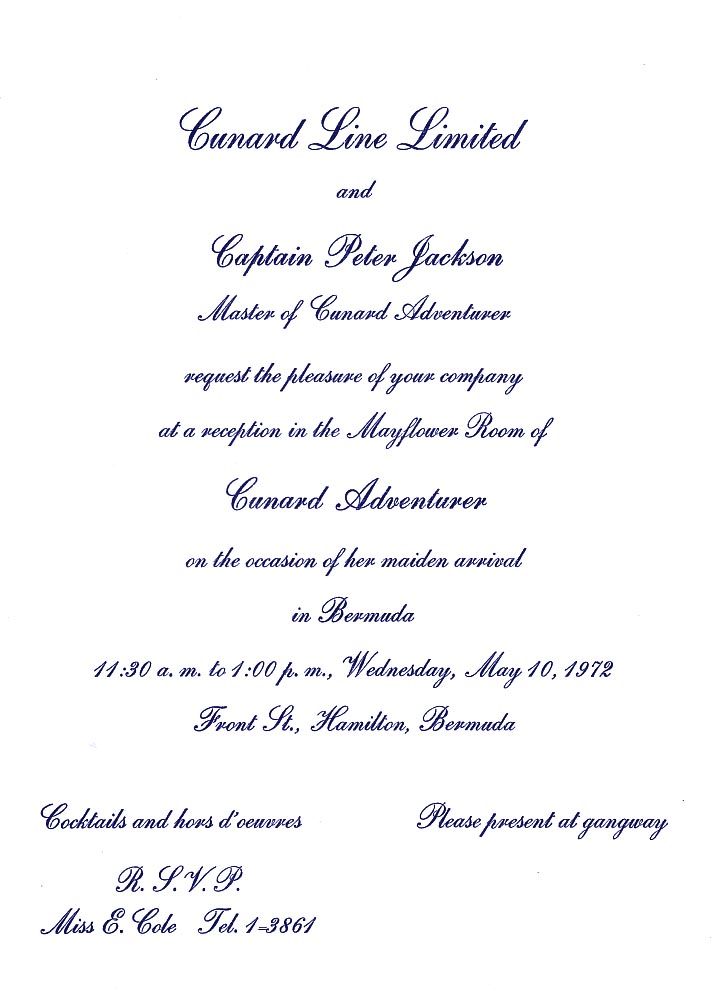
This
is a copy of a very exclusive invitation!
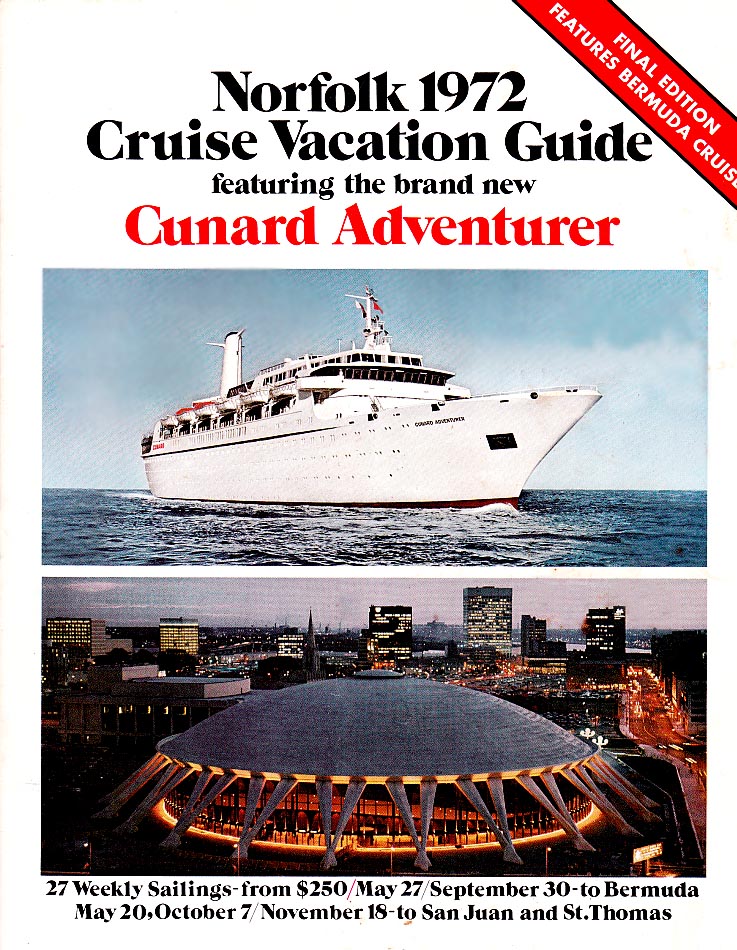
Here
we see the Norfolk
brochure from where the Adventurer operated her 7-night holiday voyages to
Hamilton Bermuda
There
would be just 2 days at sea and 4 days in Bermuda
- including arrival & departure
In addition, as was
also planned, for the Cunard Ambassador to operate annual trans-Panama
Canal
voyages bound for Vancouver
from where she would operate a series of popular 7-night Alaska
cruises and then return for another trans-Panama
Canal
voyage.
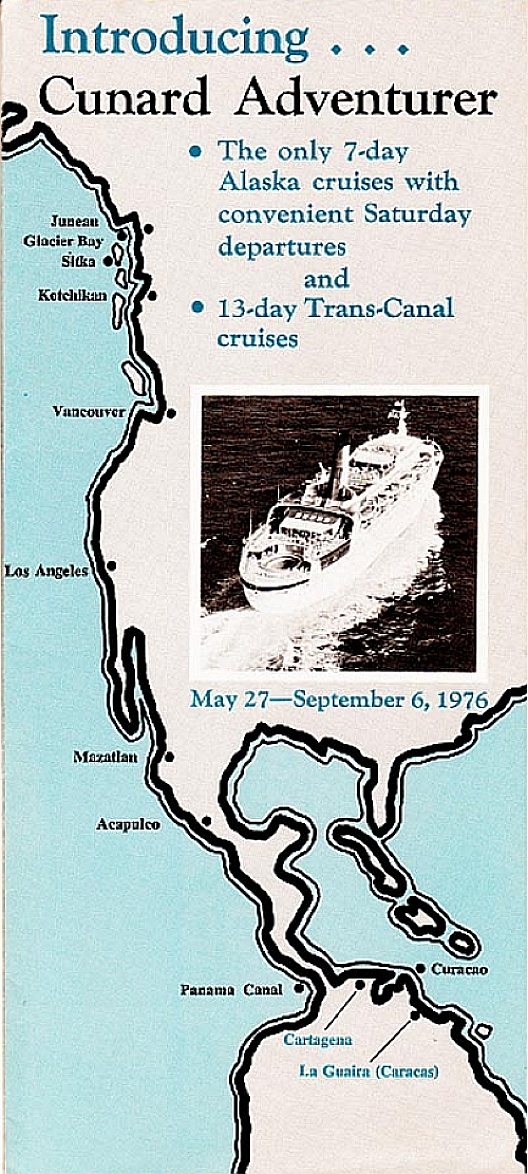
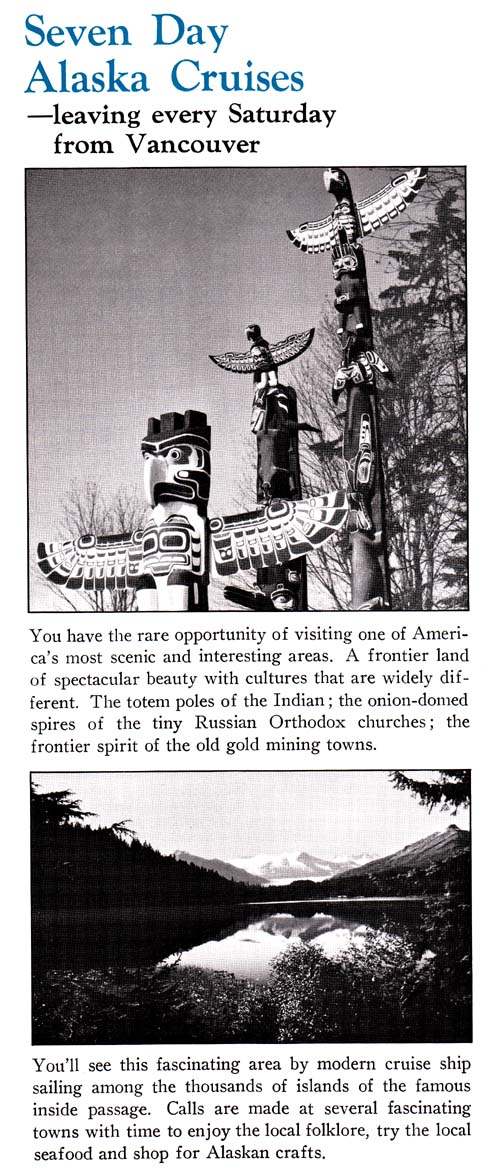
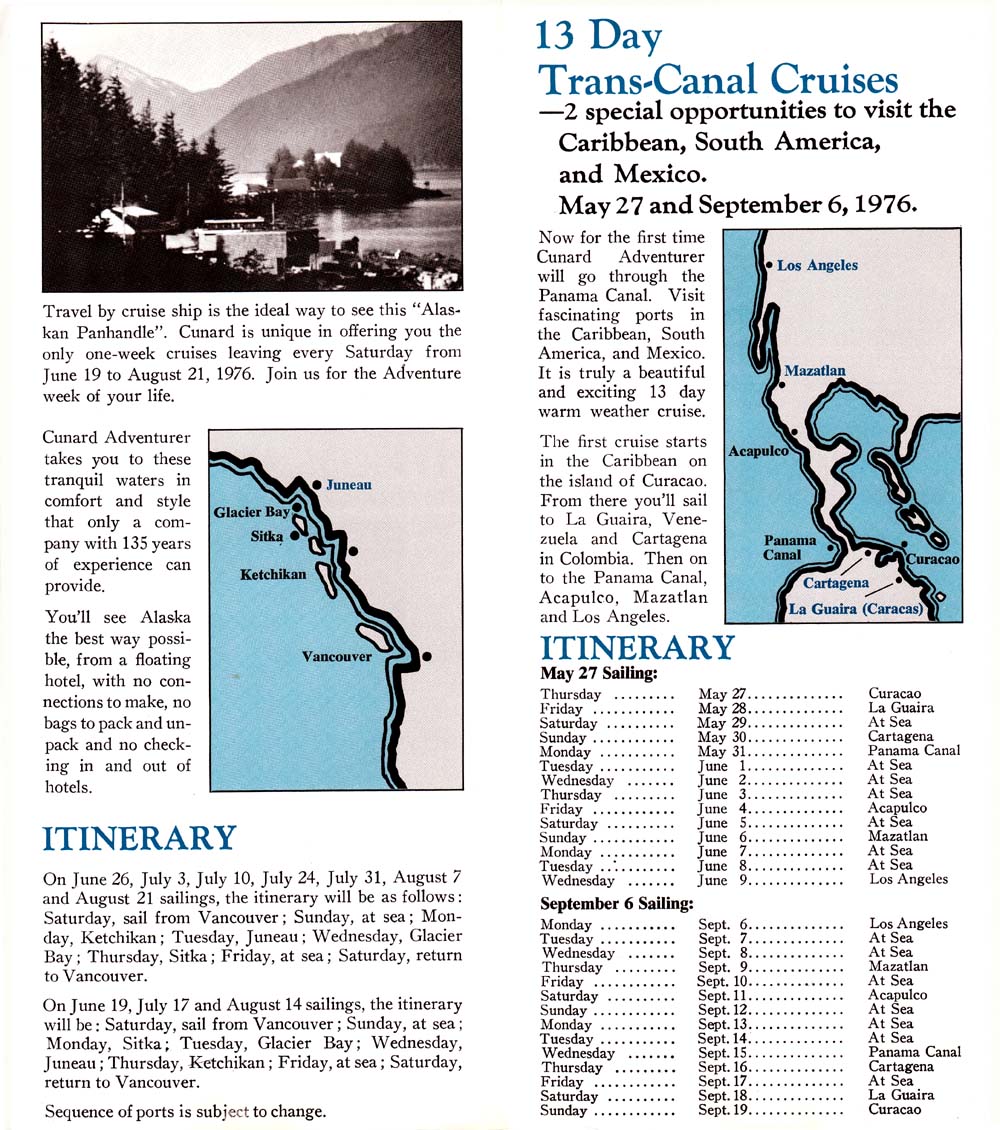
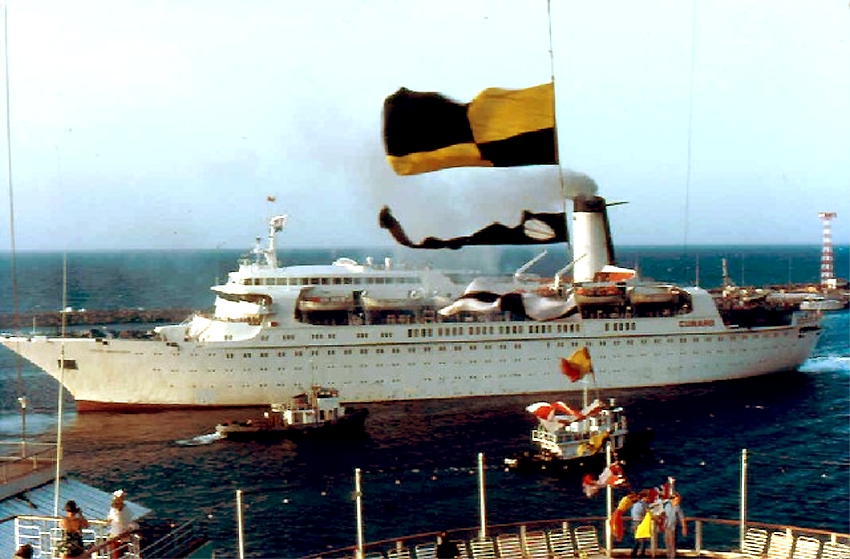
The
Cunard Adventurer is seen here from the stern of another cruise ship
At first Adventurer sold
reasonably well, but sadly as the years passed by, there were so many other
ships in the region that were by far superior to her. In 1974 her sister the
Cunard Ambassador had already been sold after a fierce fire and she been
rebuilt to become a livestock carrier sailing between the Middle East and
Australia, but she her bad luck continued and her days ended with yet another
fire!.
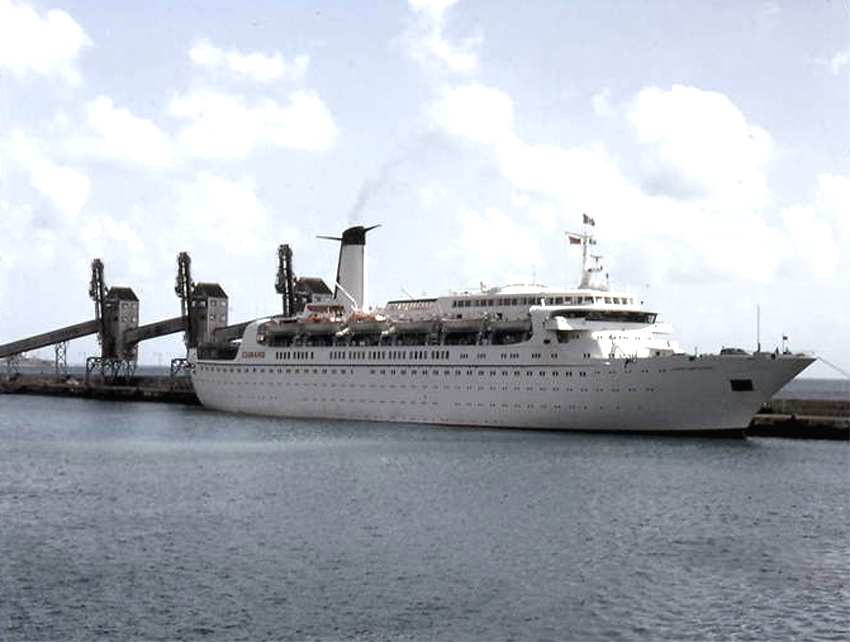
Here
we see the Cunard Adventurer in port in 1974
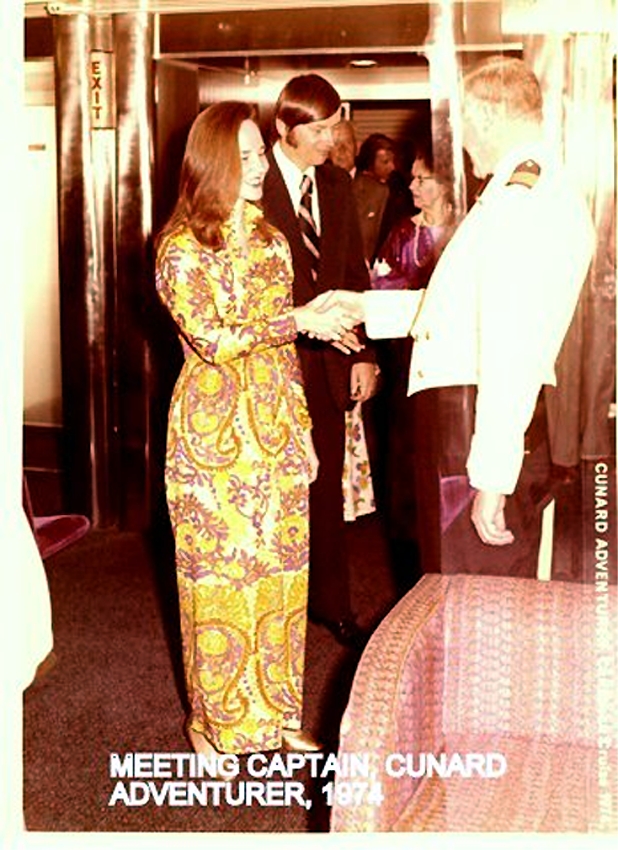
Above
& Below: Welcome to the Captain’s Dinner in 1974
Photographs
were sent in by a supporter, Photograph by thee then ships photographer
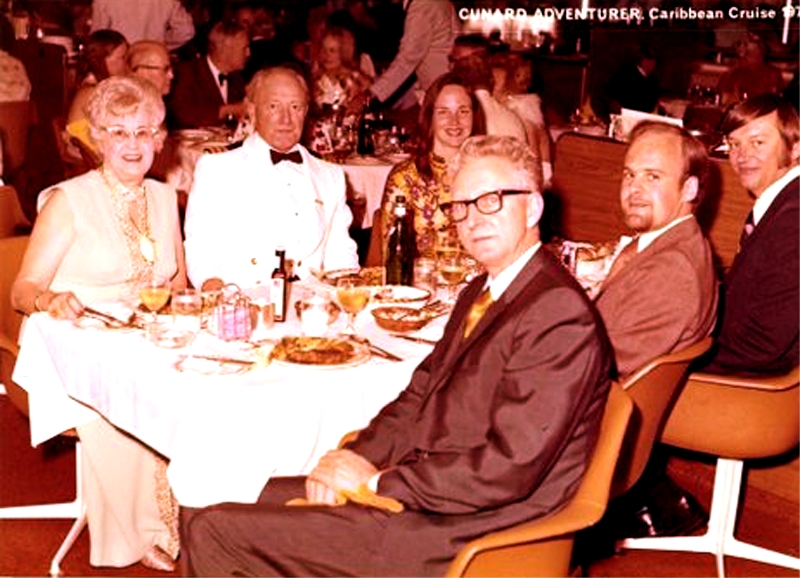
Understandably,
the news of the fire on her sister did not assist the Cunard Adventurer
greatly, and with the newer ships with superior facilities as well as many more
lounges, superior buffets, and showrooms, etc, something that the Adventurer
just did not have, she was losing passengers numbers rapidly and cost cutting
became the norm.
Suddenly in 1976 she was placed under the
ownership of “Cunard Cruise Ships Ltd.,” based in New
York
and they decided to repaint her funnel in the traditional Cunard colours, as
well as the Cunard Logo aft!
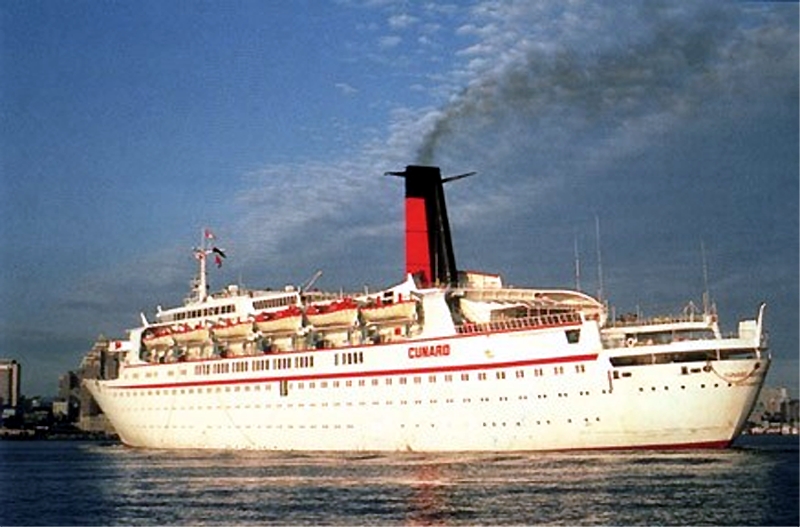
Here
we see her in the Cunard livery and arriving in port
As I already
stated, the Cunard Adventurer did not prove to be a great success for Cunard
and by 1975 and 1976 her loadings had became rather poor, so much so the time
had come that towards the end of 1976 she was no longer sustainable for Cunard
and they just had to sell her.
But why was she unsuccessful?
The truth is Cunard was not used to such
failures, but being completely realistic is, that both of these ships never
fitted the Cunard mould, for essentially Cunard’s older ships were either
three or two class liners, whilst the newer ships may seem to be One Class, but
be not fooled for they are certainly not, as they are very much three class
based ships!
The truth is, if you book in any of the
accommodations you will dine in a designated restaurant, from the super
glamorous Queens or Princess Grill, which matches the Owners suite, deluxe
Suite, Veranda Stateroom, etc,. Or there is the multi-level giant Britannia
Restaurant for the masses, thus the lower grades. And that friend's is called
the Cunard class system. Did you know that there are even separate lounges and
deck spaces available for the Queens
and Princess Grill passengers! Thus the truth was that although being First
Class, the MS Cunard Adventurer simply was not up to standard of other Cunard
ships and she certainly did not fit the company traditional mould and
traditional snob like Cunard passengers simply would not sail on this
“lower class ship!”
A Very Special Note regarding the Cunard Adventurer:
On Page Three you will discover images and photographs that cannot be found
anywhere else, for these were obtained from the builders and the ships
designers. These images contain drawings of the ship and what they would look
like, photographs of models built prior to them being built, illustration of
some of their interiors as well as their venues completed and some of the
accommodations. Then there are some superb photographs and further rare items
that make this feature on the MS Cunard Adventurer and Ambassador so very rare!
Reuben
Goossens.
Cunard Adventurer - Specifications:
Built:???????????????????????????????????? De Rotterdamsche Droogdok, Rotterdam,
Netherlands.
Yard:???????????????????????????????????? 329.
Launched:????????????????????????????? February
2, 1971.
Sea
Trails:????????????????????????????? August
28.
Delivered:????????????????????????????? October
19.
IMO
No:???????????????????????????????? 7046936.
Maiden
Voyage:?????????????????????? November 19,
1971.
Tonnage:??????????????????????????????? 14,151 GRT.
Propulsion:???????????????????????????? Four 12-cylinder
Stork-Werkspoor diesel engines.
Screws:????????????????????????????????? Twin –
28,000 BHP.
Speed:?????????????????????????????????? 21.5 knots
cruising speed / 24 knots maximum.
Length:????????????????????????????????? 148m - 486ft.
Beam:??????????????????????????????????? 22m - 72ft.
Draught:??????????????????????????????? 6.15m - 20ft.
Passengers:??????????????????????????? 832 First Class only.
Crew:??????????????????????????????????? 412.
Stabilizers:???????????????????????????? Denny Brown.
Air-conditioning:???????????????????? Throughout
The
New Beginning: MV Sunward II:
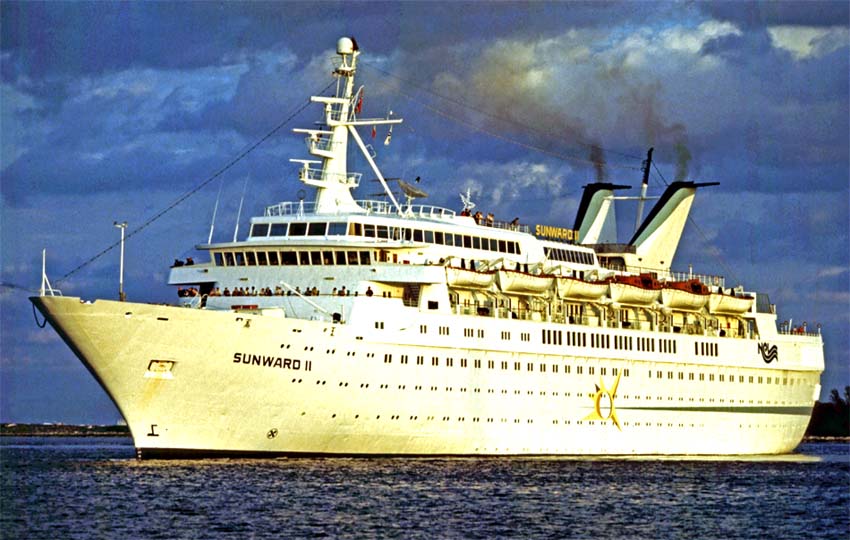
The refitted MV
Sunward
II
is seen here departing Nassau
Photograph
taken by & ? Hans Jürgen Amberg
Early in 1977 the Cunard Adventurer was sold
to Klosters
R/A,
Oslo
who renamed her Sunward II.
A really good passenger shipping mind like was
at Kloster’s, he knew what was the perfect ship for the right service,
but more so the perfect ship for the right time, thus, Kloster’s
purchased her for his NCL fleet to be used on cruises to the Bahamas cruises
out of Miami and she would operate 3 and 4 night cruises, which could be combined
as a full 7 night cruise! The longer cruises proved to be quite successful as
many who enjoyed a full week in the sun and visiting the Islands
as well as the excellent shipboard life!
But prior to all this she arrived in
Bremerhaven at the Hapag-Lloyd Shipyards on March 8, and here she was about to
received a major refit. Externally there would be the fitting of a pair of the
then traditional “side by side NCL style funnels” in place of her
original rather ugly tall smoke stack, as well as her interiors required a good
sprucing up and certainly required to be lightened up and more suitable for a
casual happy style cruising of the Caribbean.
In addition, there were other external alterations,
such as changes to her radar mast as well as the shortening of those forward
and aft side panels along the side of the ship, which were shortened by one
full deck. Upon completion she ended up looking a much smarter ship indeed,
certainly a huge improvement to when she was built, even with those side by
side funnels, which was not a greatly loved feature by a Cunard traditionalists
and maritime historians, but amazingly the vast majority over the years have
come to love them. But having spoken to one of the aforementioned just earlier
this year (2013), he admitted “They did improve the look of the ship,
even though I was very much against them at first!”
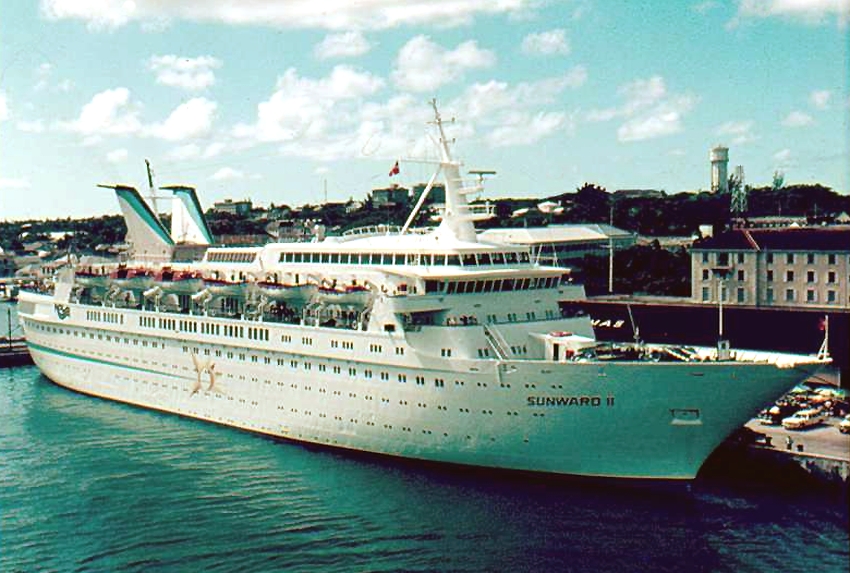
A
smart looking Sunward II seen in a Scandinavian port just after her refit
The MV
Sunward
II
was completed and delivered on April 24, 1976 having a new tonnage of 14,110
GRT, but having her passenger reduced to 718 in an all Tourist Class
configuration. She would be operated and managed by the associated
“Norwegian Cruise Lines” (NCL), and she soon sailed across the
Atlantic as she would commence cruising around the Caribbean,
where she quite unlike previously became an extremely popular and sought after
cruise ship. The main reason for this being that she was marketed to a
completely different market as well having a lower passenger capacity!
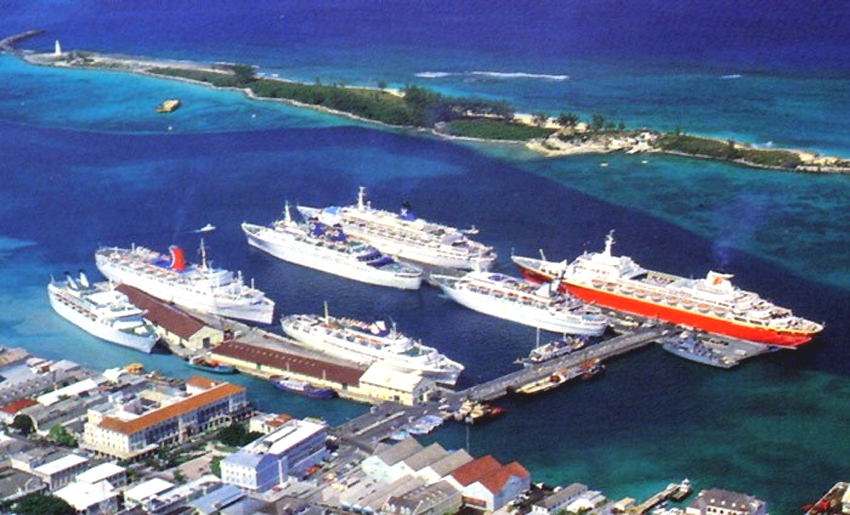
Here
we see a wonderful photo taken at Nassau
- from left to right & top to bottom
MS Southward,
SS Carnivale, SS Dolphin IV, SS Emerald Seas, MV Sunward II, MV Galileo and SS
Oceanic
Photographer
unknown – Please read the photo notes at the bottom of the page!
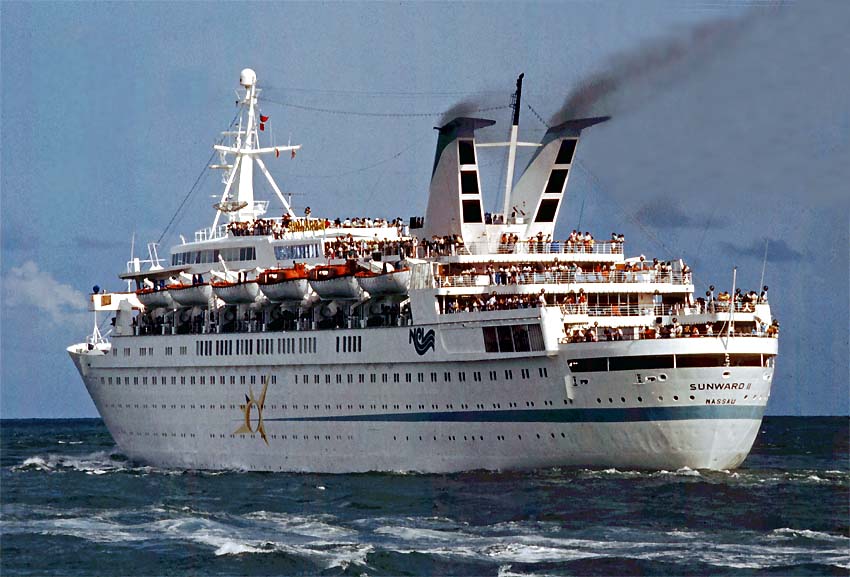
Here is a wonderful stern photograph of the Sunward
II just off Miami
in 1989
Photograph
taken by & ? Hans
Jürgen Amberg
In 1987 she was reregistered under ownership
of Klosters Cruise Ltd, Nassau.
In 1990 she received a further refit, freshening up all her interiors once
more, as well as restoring her original cabins and adding a few new ones. When
completed her new capacity was 857 passengers.
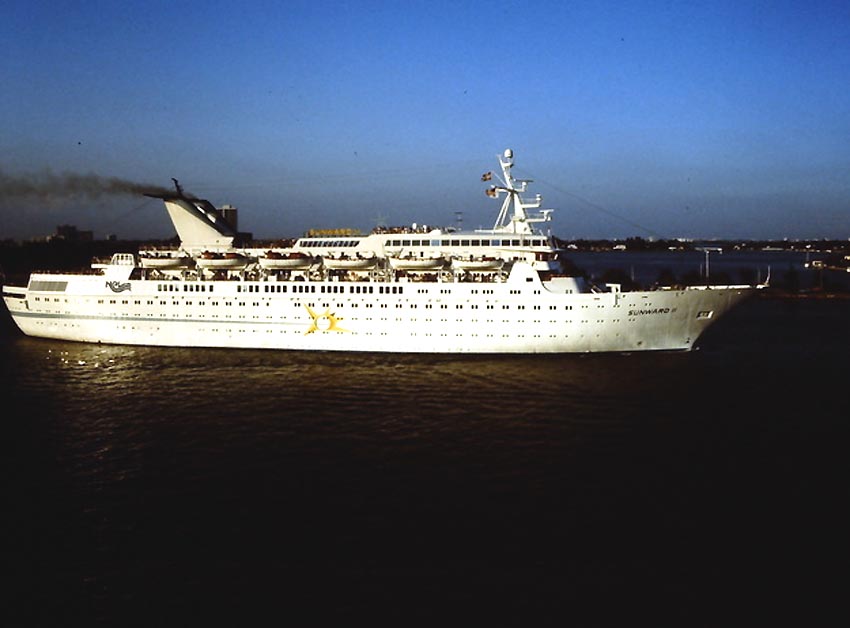
One
of the latter photographs of the MV Sunward II and she still
looked really smart!
She sailed on,
but it always seems that whenever a ship is transferred to the America’s,
that ship will soon be sold, for that is precisely what occurred in 1991! The
questions may be why, but the truth is that NCL was expanding with much larger
ships, such as the wonderful grand dame SS
France,
which had gained huge popularity, and other larger ships were joining the
fleet, and the truth is that the Sunward II and her relatively smaller sisters
were being outgrown and being sold off!
Now visit the Index
seen below and discover the ships full details with many images, brochures
& menus, as well as their next incarnation as they sailed on for many more
years most successfully and how finally the Sunward II, ex Cunard
Adventurer’s end came whilst I was writing this very special feature, mid
December 2013!
Cunard Adventurer - Ambassador - INDEX
Page
One: MS Cunard Ambassador
Including
an Introduction of both ships!
Page
Two: MS Cunard
Adventurer
Including
her next stage the: NCL’s MS Sunward II
Page Three: Photo Page
Exclusive
images and photographs covering the Cunard Adventurer
& Ambassador
Page Four: MTS Triton & MV Coral
Operated by: Epirotiki Lines & Louis Cruises
DECK
PLANS
Deck
Plan 1: Deck Plans
MS Cunard Adventurer
& Ambassador
Deck Plan 2: Deck Plan
MTS Triton
Deck
Plan 3: Deck Plan
MV Coral
***********************************
“Blue Water Liners sailing to the distant shores.
I watched them come, I watched them go and I watched them
die.”
Return to the ssMaritime MAIN INDEX
ssMaritime.com & ssMaritime.net
Where
you will discover over 1,300 Classic Liners & the 1914 built MV Doulos
Story
The
Author has been in Passenger Shipping & the Cruise Industry for some 60
years!
Also visit the …
“Save The Classic Liners Campaign”
Founded
in the early 1990’s - The author is the founder and president
Please
Note: ssmaritime and associated sites are 100%
non-commercial and the author seeks no funding or favours of any shape
or form, never have and never will!
Photographs on ssmaritime and associate
pages are by; the
author or from the author’s private collection. In addition there are
some images that have been provided by Shipping Companies and private
photographers or collectors. Credit is given to all contributors. However,
there are some photographs provided to me without details regarding the
photographer/owner concerned. I hereby invite if owners of these images would
be so kind to make them-selves known to me (my email address may be found on www.ssmaritime.com only),
in order that due credit may be given.
This notice covers all pages; although, and I have done my best to ensure that all
photographs are duly credited and that this notice is displaced on each page,
that is, when a page is updated!
ssMaritime is
owned & ? Copyright by Reuben Goossens -
All Rights Reserved



























